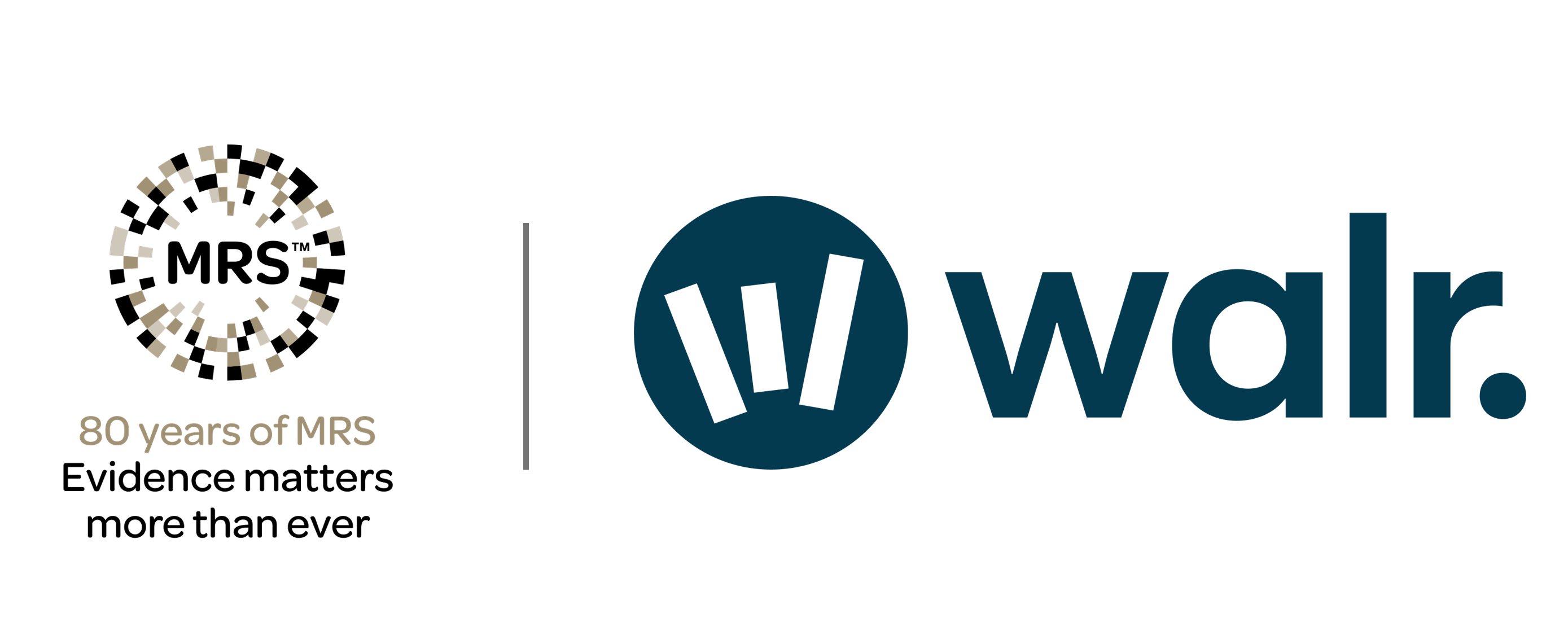Travel, Transport & Mobility

Date and time
This event has taken place
Location
Members
£455 + VAT
Non-Members
£585 + VAT
Company partners
£325 + VAT
Please let us know if you have any accessibility requirements ahead of the event
Don’t miss the new arrival from MRS. Get on board to hear the latest research and insight that will shape the future of travel, transport and mobility.
Take a deep dive into the macro trends shaping new mobility business models, uncover passenger and commuter attitudes and behaviours, showcase cutting edge customer experience research projects and share some excellent examples of successful behavioural change programmes.
Hear how:
- Virgin Holidays is taking inspiration from software development and embracing agile innovation to improve customer experience
- P&O Ferries is using virtual reality as part of a mixed methodology approach to understand and improve on-board customer experience
- London North Eastern Railway is implementing a brave behaviour change programme to grow its customer journeys
- Southeastern Railway is using a three step mixed methodology approach to customer journey mapping to pinpoint key touchpoints to improve CX
- TfL and Scope are undertaking research to highlight and improve the travel experience for people with physical and hidden disabilities
- TUI is fusing database and survey data to create fantastic hybrid segmentation which is driving marketing activities
With further contributions from: Heathrow, Transport for Greater Manchester, Highways England, Transport Focus and the Rail Delivery Group
With special thanks to:

Main Sponsor
Kadence is an award-winning, global boutique research consultancy. Our vision is to deliver ‘Insight Worth Sharing’; ensuring our work impacts the hearts and minds of those who need it the most, through the delivery of uniquely crafted, engaging and actionable deliverables which you can immediately share throughout your business.
Media Partner
Breaking market research news, latest job vacancies, industry reports, in-depth analysis and cutting-edge opinion for customer insight professionals.09.00-09.30 Registration & coffee
09.30-09.50 Extended opening remarks from the Chair
Marty Herbert, Global Head of Experience Design, KPMG
09.50-10.15 Getting people out of their cars and on to the train
Virgin Trains East Coast wanted to understand how to grow their customer journeys. They firstly needed to identify the biggest barriers to taking the train and then tackle the multifaceted ‘affordability’ issue. Hear how behaviour change research provided confidence to make a bold marketing move which resulted in increased growth of over 5%pt share vs car travel year on year.
- Using a combination of qualitative and quantitative research, to understand the different dimensions of price
- Improving customers’ perceptions of the cost of train travel
- Building a tool kit of behaviour change interventions
Annabel Wren, Associate, Incite
Lizzie Eckardt, Principal, Incite
Clare Marks, Head of Research & Insight, London North Eastern Railway
(formerly Virgin Trains East Coast)
10.15-10.45 PANEL: The future of mobility
A lively panel discussion led by Tim Sander, Director, BVA BDRC on shaping and responding to new mobility drivers and requirements and the role of different players in the future travel landscape.
John Backway, Head of Commercial Development, Southeastern
Sian Gannon, COO, Tomorrow’s Journey
Richard Rowson, Transport technology Consultant, F17
Steve Close, Senior Social Researcher, Transport Systems Catapult
10.45-11.00 Urban Mobility 2020: Unlocking the global commuting conundrum
Kadence is going to share with you a brief overview of their unique Urban Mobility study which is going to be launching in February 2019. It’s going to highlight the citizen experience of getting around 9 diverse cities around the world (Shanghai, Mumbai, Jakarta, Singapore, London, Tokyo, Berlin, New York and Los Angeles).
They are going to be profiling people’s daily commutes, uncovering painpoints, testing innovative concepts in response to these painpoints, and finally exploring which sectors and brands are most associated with these future urban mobility solutions.
Greg Clayton, Managing Director, Kadence International UK
Bianca Abulafia, Insight Director, Kadence International
11.00-11.20 Morning refreshments
11.20-11.45 Implementing, monitoring and evaluating effective travel demand management and travel behaviour change programs
Australia is currently home to some of the world’s most pioneering and innovative (TDM) programmes that are revolutionising how cities keep moving during periods of immense pressure or change. This session will share the results and lessons learnt from ground-breaking Travel Demand Management programmes including the 2018 Gold Coast Commonwealth Games, Metropolitan Melbourne Network Impact Management plan and Sydney CBD Travel Choices programs.
- Changing the behaviour of drivers and altering peak hour car movements in one of the world’s most iconic and busy cities
- Delivering a robust and responsive tracking monitoring and evaluation program for continuous evaluation and improvement
Rose McArthur – Technical Principal, Travel Demand Management, Mott MacDonald
11.45-12.10 Restricted access: ensuring mobility for all
More than one in ten UK adults are affected by physical mobility issues. Working in partnership with Scope, Opinium created an innovative programme of research utilising daily video diaries, journey mapping, geo-tagging and qualitative interviews designed to uncover the physical and attitudinal barriers faced by disabled people, explore the impact these restrictions had on their day-to-day lives and to inform future transport policy development.
- Examining how to improve customer journeys for people with mobility issues
- Sharing achievements and set-backs from the project
- How this insight is being used to drive long-term change
Wez Eathorne, Research Director, Opinium
Kapila Perera, Head of Research and Impact, Scope
12.10-12.40 Tackling sensitive and ‘hidden’ issues on the London Underground
In this session TfL will share a programme of important work it is undertaking to address sensitive issues and change social norms on the underground. It will focus on two case studies.
Improving the journey experience for thousands of Londoners with hidden disabilities
The ‘Please offer me a seat’ badge and card scheme was designed by TfL to help those with hidden disabilities and conditions travel more comfortably and confidently on the London transport network. To ensure the scheme would lead to positive behaviour change research was needed to trial the POMAS scheme in a real-world environment, before implementation.
Emma Johns, Associate Director, 2CV
Alison Gibbs, Insight Manager, TfL
Preventing suicides on London underground: speaking the unspeakable
Reducing the number of suicides that occur on London Underground is an important goal for TfL and requires an evidence-based, network wide prevention strategy. But how do you find the right way to talk to the public about suicide, without making the problem seem more widespread than it is, confusing customers, or risking reputational damage. This case study, will examine a fresh approach taken to tackle the unique challenges of this sensitive project.
Chloe De Schryver, Research Manager, 2CV
Martin Bendrey, Programme Lead For Suicide Prevention, TfL
12.40-13.40 Lunch
13.40-14.05 Unpicking changing customer priorities guiding travel choices and experiences
Transport Focus is keen to understand changing trends, needs and expectations of rail passengers. This paper will present a story using new insights from the National Rail Passenger Survey & other surveys around how changing patterns in the workplace, and changing priorities for how to make the most of travel time, are having an impact not only on the practical needs of commuters and business travellers, but also their emotional needs while travelling.
Sinéad Jefferies, Consultant, Watermelon
Ian Wright, Head of Innovation and Partnerships, Transport Focus
14.05-14.30 P&O Ferries case study: embracing virtual reality as part of a mixed methodology approach to understanding on-board CX
P&O Ferries wanted to gain a deep understanding of the on-board Dover to Calais experience and how this could be improved. Virtual Reality exposed an additional rich source of untapped insight. Hear how VR, alongside online quant surveys, a value needs segmentation, on-board exit interviews and an online community, provided detailed feedback and helped to unpick the perceptions of P&O’s passengers.
Dr Ali Goode, Cognitive Scientist, Gorilla in the Room
Helen Bailey, Managing Director, Aviatrix
Michaela Mullen, Head of Customer Experience, P&O Ferries
14.30-14.55 Southeastern Railway case study: mapping the customer journey
Having modelled the entire customer experience into a seven-stage journey map, Southeastern needed to understand priority areas as defined by passengers, both emotionally as well as rationally, that will become the key focus to improve performance. This session will examine the 3 stage approach was applied to meet the objectives:
- A qualitative ethnographic study where real passengers recorded their in-the-moment experience with touchpoints and emotions in an app-based diary
- Qualitative discussion groups that included image-based emotion elicitation techniques
- A quantitative online survey amongst Southeastern users with a preferred choice technique to determine the priority order of focus
Thomas Folqué, Research Manager, Director On the Move Division, BVA BDRC
Howard Tarr, Head of Insights, Southeastern Railway
14.55-15.20 TUI UK case study: fusing database and survey data to create a fantastic “hybrid segmentation” in the travel category
Attitudinal segmentations have been the go-to approach for market segmentation since the 1970s. But the data world has changed, and many companies now have rich databases at the centre of their marketing activities. So how do you get the best of both worlds? The answer is hybrid segmentation: the fusion of attitudinal survey data with database variables relating to transactions and (geo) demographics. This case study will illustrate how hybrid segmentation is driving marketing activities at TUI - one of the world’s leading travel companies.
Dr. Leigh Morris, Managing Director, Bonamy Finch
Karen Bilsborough, Senior Customer Insight Manager, TUI
15.20-15.40 Afternoon refreshments
15.40-16.05 Understanding travellers’ response to information provision during disruption
Social media is a two-edged sword when dealing with unplanned disruptions, delays and congestion. Operators can communicate issues instantly to passengers but similarly passengers can vent their frustrations instantly and publically which can cause reputational damage.
This session will examine ‘in the moment’ insights from consumers experiencing disruption and travellers’ satisfaction with the information provided by train operators.
- Analysing key findings from the pilot and main stages and updating on current survey activity
- How are research findings being used to optimise social media communications?
Rob Sheldon, Managing Director, Accent
Marc Horrex, Customer Insights Research, Rail Delivery Group
16.05-16.30 Cycle triggers qualitative research
Transport for Greater Manchester (TfGM) has an aim to significantly increase take-up in cycling and to make cycling a safe, viable and attractive alternative to car travel. This session will explore how the research uncovered the various stages of cycling engagement, the common barriers and enablers to cycling and the key tipping points through which these factors can positively or negatively exert their influence.
Zoe Cooper, Human Factors Specialist, Mott MacDonald
16.30-16.55 Can behavioural science save lives? exploring driver perceptions and behaviour around breakdowns
Breakdowns resemble a fight or flight situation where drivers have only a matter of seconds to make life changing decisions under immense pressure. Highways England wanted to understand how people react in the event of a breakdown to reduce the number of kills and serious injuries (KSIs). A mixed method approach rooted in behavioural science was used to understand the decision-making process in this context.
- Uncovering the underlying psychological process behind drivers’ responses during breakdown situations
- Designing a quantitative online survey based on implicit tools that replicate decision making under time pressure
- Key recommendations for campaigns and messages to communicate breakdown safety to drivers
Will Folan-Conray, Research & Client Partnership Director, Irrational Agency
Pankti Shah, Behavioural Economist, Irrational Agency
Manjit Galsinh, Acting Head of Insight, Highways England
16.55-17.05 Closing remarks from Chair
17.15 Sponsored drinks reception
Additional Information
Date and time
This event has taken place
Location
Members
£455 + VAT
Non-Members
£585 + VAT
Company partners
£325 + VAT
Please let us know if you have any accessibility requirements ahead of the event
Get the latest MRS news
Our newsletters cover the latest MRS events, policy updates and research news.












